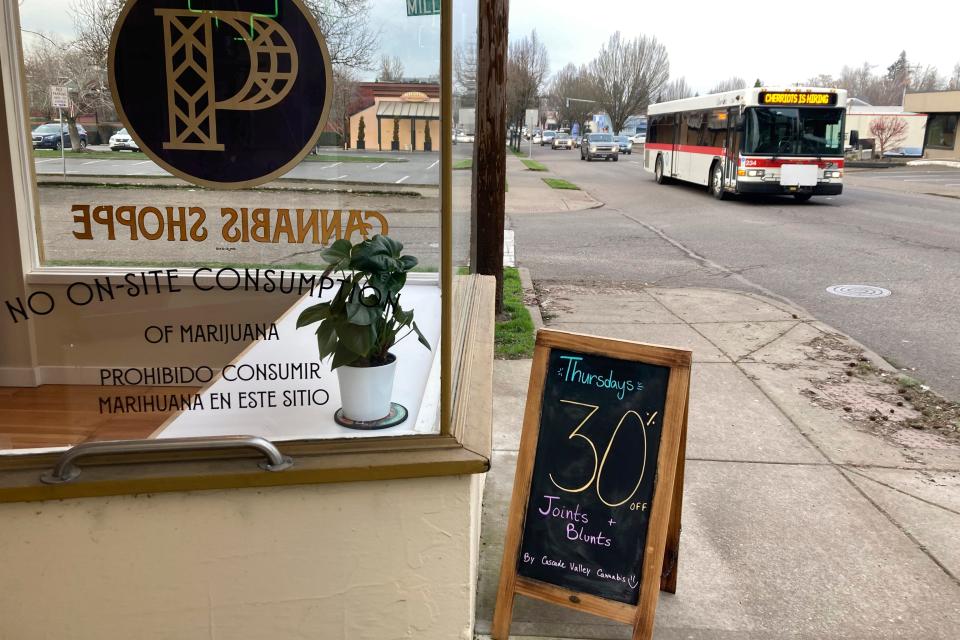Questions about Fagan's connections to marijuana industry overshadow audit

- Oops!Something went wrong.Please try again later.
Questions surrounding the secretary of state's role in consulting for a private cannabis company overshadowed a report released Friday about how the state is handling marijuana-related businesses.
After a report came out that Secretary of State Shemia Fagan recused herself from the audit process after taking on a consulting job with a private marijuana company that operates in Oregon, Republican leaders called for Fagan to resign.
“She must resign,” Senate Republican Leader Tim Knopp and House Republican Leader Vikki Breese-Iverson said in a joint statement. “This appears to be an ethics violation and if it isn’t then Oregon’s ethics laws are broken. An elected official cannot take funds for personal use from someone they regulate.”
Fagan has not commented on the resignation call but KOIN reported Fagan told her staff in a Feb. 15 letter: “I do not believe a real conflict exists because any action required would be taken by the Legislature or OLCC (Oregon Liquor and Cannabis Commission) and any benefit could flow to all cannabis companies in Oregon, not this specific company.”
What the audit said
According to the state audit that was released earlier in the day by the Secretary of State's Office, some state agencies are hampering Oregon marijuana businesses by not working with them due to concerns about criminal liability at the federal level and losing federal funding.
The audit also found the state agency with oversight of cannabis businesses treats them differently than other businesses it oversees. And Oregon has yet to implement any social equity programs despite people of color being adversely impacted by past law enforcement of marijuana.
“Oregon’s regulatory system for cannabis compounds the already significant issues faced by members of this industry stemming from federal restrictions on cannabis,” deputy secretary of state Cheryl Myers said.
Cannabis remains illegal at the federal level, but voters in Oregon legalized medicinal marijuana in 1998, and in 2014 approved legalizing recreational marijuana.
Thirty-seven states and the District of Columbia have approved medicinal marijuana, and recreational marijuana is legal in 21 states and D.C.
The federal government has slowly moved toward decriminalization, including President Joe Biden’s Oct. 6 pardon of all prior federal offenses for simple possession of cannabis.
Oregon can do more in anticipation of federal decriminalization
The audit said the state believes there will be a high demand for Oregon-grown and manufactured cannabis products in other states if it becomes federally legal and the state can do more to prepare for that.
The Oregon Liquor and Cannabis Commission, the state agency that regulates cannabis, has licensed about 2,800 recreational marijuana dispensaries or manufacturing facilities and there are some 63,000 active cannabis worker permits.
There were $1.18 billion in recreational marijuana sales in Oregon in 2021, according to the Liquor and Cannabis Commission. The state received $311 million from taxes on sales of cannabis in the 2019-2021 biennium.
Economic development agency doesn't work with cannabis businesses
The audit said Business Oregon, the state’s economic development agency, chooses not to work with cannabis businesses as part of a risk management strategy intended to prevent federal intervention.
That causes unclear messaging from the state about the industry, which could open the state up to legal risks, the auditors said.
In a December interview, Canyon Cannabis owner Thorin Thacker said he was unable to get any state or federal wildfire recovery money for his Gates business that burned down in the 2020 Labor Day wildfires.
The sign on the highway at his new location in Mill City was paid for by the Santiam Canyon Wildfire Relief Fund, a nonprofit.
Business Oregon told auditors the agency was worried that working with cannabis businesses could violate federal grants and threaten the $122 million it received in the 2021-2023 biennium, about 5.7% of the agency’s budget.
The auditors noted the Oregon Health Authority received $18 billion from the federal government in the same period, but hadn’t lost any funding due to its involvement with the cannabis industry.

Uneven application of regulations on marijuana businesses
The auditors said the OLCC unevenly applies regulations on marijuana businesses, including fining license holders thousands of dollars if their security system fails or if they improperly track product.
The OLCC also requires steel doors and frames, and a video surveillance system for all cannabis businesses. Businesses in the alcohol industry, which the agency also oversees, do not have to follow those same rules.
"We couldn’t find evidence of their effectiveness, but we did find evidence they were costly. We’re not suggesting, hey, let’s get rid of all the regulations," Kip Memmott, audit director for the Secretary of State, said. "It’s that whole thing of getting the right regulations and the right level based on emerging science and based on there’s 47 other states that have some level of legal cannabis."
He said now is the time to make some changes.
“Given the action taken at the federal level, now we believe is the time to prepare a system for a future when cannabis is legal nationally," he said. "How do we embrace this industry and treat it like every other industry?"
OLCC and lawmakers told auditors some of those safeguards are to protect against minors consuming cannabis.
In 2020, there were more than 100 robberies, burglaries and looting at cannabis businesses in Portland and more than $580,000 in cash and marijuana was taken, according to the audit.
The auditors point out that those incidences have turned into a public safety risk.
Oregon hasn't launched any social equity cannabis programs
Some states set aside 50% of licenses for equity applicants, waive application fees or give their applications technical assistance and financially invest in communities most impacted by disproportionate cannabis enforcement.
According to a 2017 survey, 4.3% of legal cannabis businesses were Black-owned and 5.7% were owned by those who are Hispanic or Latino. Those groups make up 33% of the population in the United States.
The audit said social equity programs have faced legal challenges, such as when the state set aside $62 million of its $1.4 billion in federal COVID-19 relief funds for Black business owners.
The auditors also noted the state doesn’t track demographic information for licenses.
Fagan's connections to the marijuana industry
Willamette Week reported Thursday that Secretary of State Shemia Fagan agreed in February to privately consult with Veriede Holding, an affiliate of the La Mota chain of cannabis shops.
Because of that, she recused herself from the audit.
Memmott said Fagan participated in two kick-off meetings for the audit, but recused herself after entering the business relationship and was no longer in meetings about the audit that she usually would be in.
“Bottom line, she can tell me what to audit,” he said. “What she can’t tell us to do is what to find in those models.”
Willamette Week has previously reported the owners of the dispensaries, Rosa Sazares and Aaron Mitchell, have failed to pay millions of dollars in cannabis taxes and federal income taxes and face workplace complaints and unpaid bills.
Fagan's professional experience includes practicing employment law, but she is no longer licensed by the state bar.
According to a Secretary of State's Office spokesperson, Fagan recused herself from the audit due to consulting with the company on an out-of-state project.
Republicans in their media statement also referenced controversies surrounding the OLCC, which has been under fire in the past few months and agency leaders have been fired after it was discovered that they diverted bottles of high-end bourbon to themselves and possibly some state lawmakers.
“We have been continually calling for oversight into the OLCC and this industry. And yet, another turn of government misuse is apparent today. Democracy will die in darkness if we don’t hold elected officials accountable,” Breese-Iverson said in a statement.
Bill Poehler covers Marion County for the Statesman Journal. Contact him at bpoehler@StatesmanJournal.com
This article originally appeared on Salem Statesman Journal: Some Oregon agencies won't work with marijuana businesses, audit finds

